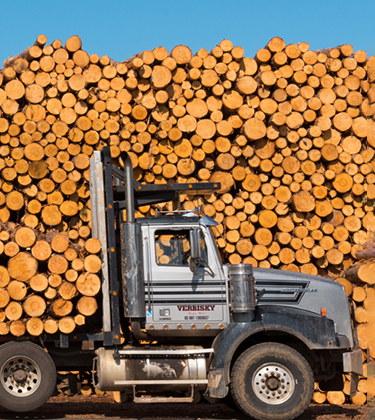
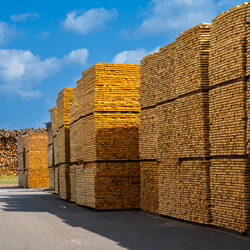
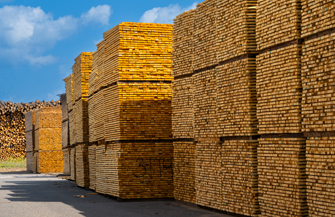
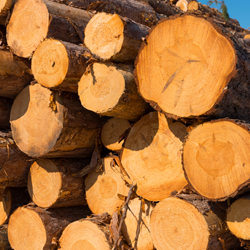
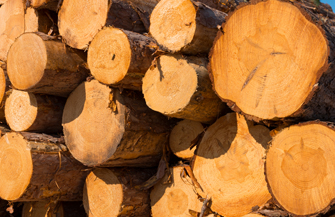
Our Gwinn, Michigan wood products facility produces lumber from spruce, pine, and fir species. PotlatchDeltic does not own timberlands surrounding Gwinn, but instead sources fiber from Michigan, Wisconsin, and Ontario, Canada. Fiber sourcing is Sustainable Forestry Initiative® (SFI®) Fiber Sourcing certified and Forest Stewardship Council® (FSC®) Chain of Custody (CoC) certified.
How is the fiber tracked for FSC Chain of Custody Certification?
FSC Chain of Custody certification ensures that fiber entering a mill either originates from a FSC certified land base, or for the fiber that is not certified, it is procured under the FSC Controlled Wood (CW) standard. The FSC CW standard ensures that fiber does not originate from undesirable sources.
The Gwinn lumber mill purchased over 735,000 tons of fiber in 2023, which is the equivalent of almost 17,000 truckloads that crossed our scales. Over 11% of that fiber originated from FSC certified Michigan Department of Natural Resources (MDNR) lands. The location of all sales from the MDNR is known as a matter of standard business practice due to both the contract we have with the state and trip tickets associated with each load that leaves the harvest site.
Further, because the ownership of the wood changes the moment loaded trucks leave the MDNR landing, the open-market contractors who harvest and haul that fiber must also be FSC CoC certified. Gwinn log procurement staff work with a logger group comprised of 9 independent contractors who developed their own certification policies and processes, and in turn, are audited by a third party on an annual basis for compliance with the CoC standard. This process ensures that the certification “chain” is not broken from the harvest site until the wood reaches the Gwinn mill. This open-market logger group delivered approximately 97% of that FSC certified fiber, with the balance coming from MDNR sales that PotlatchDeltic purchased directly.
What is Controlled Wood?
The remaining 89% of the fiber that is utilized by the Gwinn mill originates from non-certified landowners – small, family landowners, non-FSC certified industrial landowners, the US Forest Service, county and state land fiber that does not fall under our CoC certified logger group, etc. The CW standard ensures fiber that is not certified does not come from the following undesirable sources:
- illegally harvested forests;
- forests that were harvested in violation of traditional and civil rights;
- forests where high conservation values (HCV) are threatened by management activities;
- natural forests that were converted to non-forest uses; and
- forests with genetically modified trees
To ensure none of our fiber comes from these sources, a Due Diligence System, or DDS, is required. PotlatchDeltic contracts with an outside vendor to develop our DDS. The DDS consists of information about the Gwinn mill – species used for our products (i.e., spruce, fir, and pine species) and procurement areas (Michigan and Wisconsin in the U.S., and the province of Ontario, Canada).
This information is then compared against the applicable National Risk Assessments (NRAs) that are independently developed by FSC US (Version 1, completed April 5, 2019) and FSC Canada (Version 2, completed November 5, 2019), respectively. The NRAs rank states and provinces for the five undesirable sourcing categories as either “Low Risk” or “Specified Risk,” and also provide optional or mandatory control measures to mitigate any Specified Risks. In the U.S., the DDS confirms that for Gwinn’s procurement zones, all five the undesirable sources are a Low Risk, thus no further control measures are needed.
In Ontario, Category 2 - Traditional and Civil Rights, and Category 3 - HCV Threats are considered Specified Risk, while the other three categories are Low Risk. For the Specified Risk areas, control measures have been implemented – for example, for Traditional and Civil Rights, reaching out to stakeholders to confirm they do not oppose forest management plans, and engagement with indigenous peoples with legal and customary rights with the forest management units. For HCV Threats, examples of control measures include compiling evidence that harvesting does not take place in critical habitat for specified risk species, is consistent with federally approved actions, or is permitted through federal law; and that private landowners are aware of critical habitats, threats to that habitat, BMPs to reduce threats, and that actions are implemented to mitigate threats. Evidence to confirm these control measures continue to be adequate must be reviewed annually by our DDS vendor.
Our Gwinn log procurement staff works diligently to ensure that the fiber we use is sourced legally and responsibly, and FSC CoC certification is a reliable and trusted system to instill confidence in this aspect of our supply chain.


